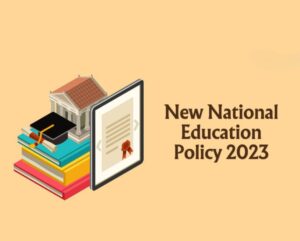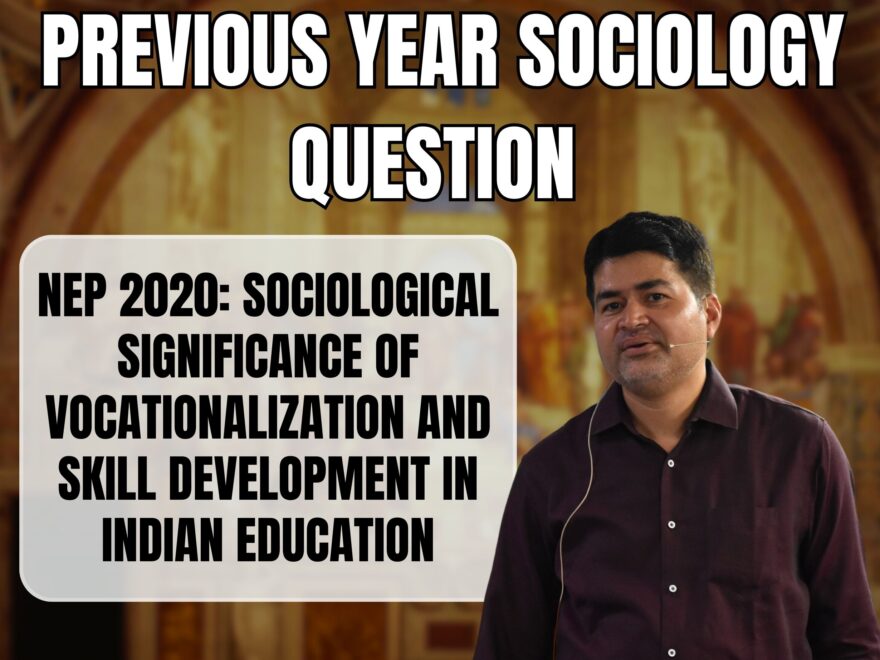Explain the Sociological Significance of the NEW EDUCATION POLICY and its Thrust on Vocationalization and Skill Development.
(Paper: 2, Section- B, Year 2021, Unit 13: Social Changes in India, Education and Social Change )

Explain the Sociological Significance of the NEW EDUCATION POLICY and Its Thrust on Vocationalization and Skill Development.
(20 Marks)
| Introduction: Basic Idea About New Education Policy
Main Body: Significance of New Education Policy Conclusion: Education as an Agency to Become Self–Reliant |
Introduction
Education is a fundamental pillar for unlocking human potential, fostering equity and justice within society, and driving national development. The National Education Policy (NEP) 2020 places a special emphasis on nurturing the creative potential of each individual. It is grounded in the belief that education should not only cultivate cognitive abilities such as literacy, numeracy, critical thinking, and problem-solving but also develop social, ethical, and emotional capacities and inclinations.
Main Body
Significance of New Education Policy
- Social Mobility and Equality: The NEP’s focus on vocational education and skill development aims to reduce the gap between theoretical knowledge and practical skills. This can enhance social mobility by providing opportunities for individuals from diverse socio-economic backgrounds to acquire employable skills. YOGENDRA SINGH has highlighted the role of education to bring social change. This can help reduce educational disparities and promote social equality.
- Changing Workforce Dynamics: The global economy is shifting towards knowledge-based and technology-driven industries. According to Foucault, power and knowledge are not seen as independent entities but are inextricably related—knowledge is always an exercise of power and power always a function of knowledge. The NEP’s emphasis on skill development aligns with these changing workforce dynamics. Hence national education policy will ensure to providing bargaining power as a skilled worker for the evolving job market, promoting adaptability and competitiveness.
- Reducing Unemployment and Underemployment: High levels of unemployment and underemployment have ramifications, including feelings of alienation, social unrest, and economic instability. The NEP’s vocationalization can help address this issue by equipping students with practical skills that are in demand, potentially reducing unemployment rates and its associated social challenges.
- Gender Equity: Vocational education and skill development can play a vital role in promoting gender equity. By encouraging girls and women to pursue non-traditional fields, the NEP can challenge societal norms and stereotypes. This can lead to greater gender diversity in the workforce, contributing to broader social change.
- Cultural and Regional Diversity: India is a diverse country with various cultures, languages, and regional variations. The NEP acknowledges this diversity and promotes a more flexible and holistic approach to education. It recognizes the importance of preserving and celebrating cultural identities while ensuring access to quality education for all.
- Inclusivity and Access: The NEP aims to make education more inclusive by addressing the needs of marginalized and disadvantaged communities. This aspect is crucial for social justice, as it strives to bridge the educational gap between different sections of society, ultimately contributing to a more equitable society.
- Community and Skill Ecosystem: Vocational education often involves collaboration with local industries and communities. This creates a symbiotic relationship between education institutions and society, where students can gain real-world experience..
- Lifelong Learning and Social Change: The NEP promotes lifelong learning and skill development, recognizing that education is not limited to a specific age or stage of life. This sociological perspective aligns with the idea that learning is a continuous process that contributes to personal growth and societal change.
- Global Citizenship: By instilling pride in Indian culture and values while promoting global awareness, the NEP fosters responsible and informed global citizens. This sociological dimension emphasizes the importance of values and attitudes that support human rights, sustainability, and global well-being.
Conclusion
The National Education Policy 2020 (NEP) strongly resonates with Mahatma Gandhi’s vision of education. By emphasizing a practical and experiential approach, connecting learning to real-life skills and social responsibilities, the NEP aligns with Gandhi’s belief in empowering individuals to become self-reliant and serve society. This convergence reflects a commitment to holistic education and aligns India’s educational system with its foundational values.
Related Blogs …
To master these intricacies and fare well in the Sociology Optional Syllabus, aspiring sociologists might benefit from guidance by the Best Sociology Optional Teacher and participation in the Best Sociology Optional Coaching. These avenues provide comprehensive assistance, ensuring a solid understanding of sociology’s diverse methodologies and techniques.
META TAGS:
New Education Policy 2020, NEP 2020, New education policy sociology, New education policy 2020 sociology, New education policy sociology upsc, New education policy subject combination, Vocationalization, Skill Development, Sociological Significance, Social Mobility, Gender Equity, Inclusivity, Lifelong Learning, YOGENDRA SINGH, Foucault, Gandhi’s Vision, Indian Education System
Why Vikash Ranjan’s Classes for Sociology?
Proper guidance and assistance are required to learn the skill of interlinking current happenings with the conventional topics. VIKASH RANJAN SIR at TRIUMPH IAS guides students according to the Recent Trends of UPSC, making him the Best Sociology Teacher for Sociology Optional UPSC.
At Triumph IAS, the Best Sociology Optional Coaching platform, we not only provide the best study material and applied classes for Sociology for IAS but also conduct regular assignments and class tests to assess candidates’ writing skills and understanding of the subject.
Choose The Best Sociology Optional Teacher for IAS Preparation?
At the beginning of the journey for Civil Services Examination preparation, many students face a pivotal decision – selecting their optional subject. Questions such as “which optional subject is the best?” and “which optional subject is the most scoring?” frequently come to mind. Choosing the right optional subject, like choosing the best sociology optional teacher, is a subjective yet vital step that requires a thoughtful decision based on facts. A misstep in this crucial decision can indeed prove disastrous.
Ever since the exam pattern was revamped in 2013, the UPSC has eliminated the need for a second optional subject. Now, candidates have to choose only one optional subject for the UPSC Mains, which has two papers of 250 marks each. One of the compelling choices for many has been the sociology optional. However, it’s strongly advised to decide on your optional subject for mains well ahead of time to get sufficient time to complete the syllabus. After all, most students score similarly in General Studies Papers; it’s the score in the optional subject & essay that contributes significantly to the final selection.
“A sound strategy does not rely solely on the popular
Opinion of toppers or famous YouTubers cum teachers.”
It requires understanding one’s ability, interest, and the relevance of the subject, not just for the exam but also for life in general. Hence, when selecting the best sociology teacher, one must consider the usefulness of sociology optional coaching in General Studies, Essay, and Personality Test.
The choice of the optional subject should be based on objective criteria, such as the nature, scope, and size of the syllabus, uniformity and stability in the question pattern, relevance of the syllabic content in daily life in society, and the availability of study material and guidance. For example, choosing the best sociology optional coaching can ensure access to top-quality study materials and experienced teachers. Always remember, the approach of the UPSC optional subject differs from your academic studies of subjects. Therefore, before settling for sociology optional, you need to analyze the syllabus, previous years’ pattern, subject requirements (be it ideal, visionary, numerical, conceptual theoretical), and your comfort level with the subject.
This decision marks a critical point in your UPSC – CSE journey, potentially determining your success in a career in IAS/Civil Services. Therefore, it’s crucial to choose wisely, whether it’s the optional subject or the best sociology optional teacher. Always base your decision on accurate facts, and never let your emotional biases guide your choices. After all, the search for the best sociology optional coaching is about finding the perfect fit for your unique academic needs and aspirations.
Follow us :
🔎 https://www.instagram.com/triumphias
🔎https://www.youtube.com/c/TriumphIAS
https://t.me/VikashRanjanSociology
Find More Blogs
|
Scope of the subject and comparison with other social sciences |
|||
|
|
|
|
Modernity and social changes in Europe |


2 comments